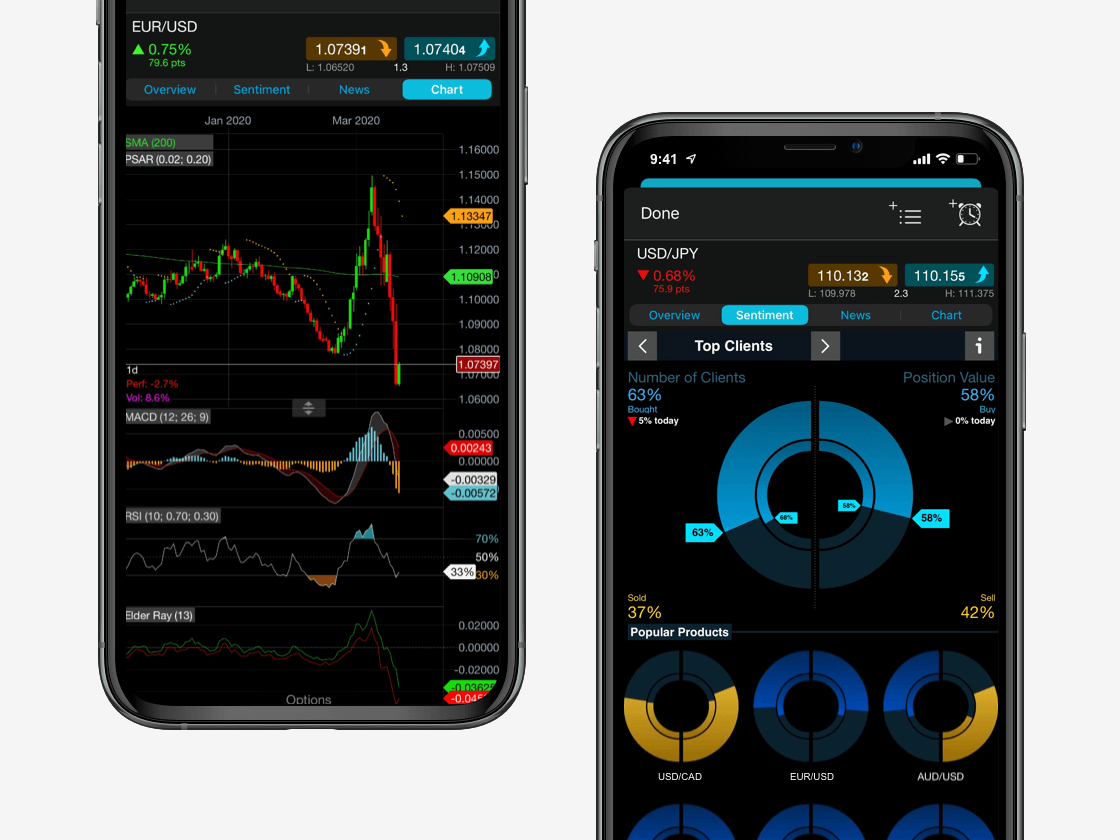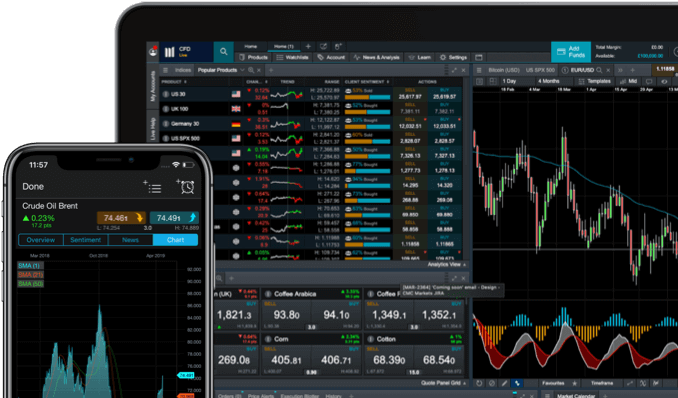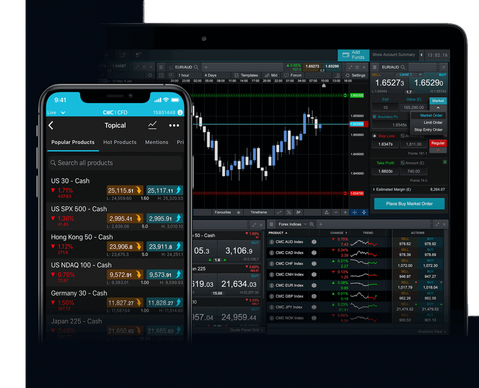20 defence stocks to watch
Defence stocks cover companies whose primary business is providing military or law enforcement with weaponry, vehicles, aircraft, tactical clothing, or aid in producing parts or services for these applications. Cybersecurity, intelligence, IT, aerospace and robotics companies may also qualify as defence stocks if they support military or law enforcement.
In this article, we will cover some top defence stocks from around the world, in terms of revenue and market share, and explore why defence stocks are attractive to some investors and traders. If you want to speculate risk-free on the price movements of defence companies via spread bets and CFDs, why not open a demo account first?
What makes defence stocks attractive?
Defence stocks can be attractive to trade because these companies experience consistent demand for their services. Governments around the world have large military budgets, with the US having the highest military spend of any country. A significant portion of those funds get directed to defence companies who provide weaponry, supplies and/or aerospace technology to the military and law enforcement, as well as other industries.
As long as there is need for a military, governments will create a budget for it, and defence companies will supply what is needed. In this way, some consider defence stocks to be relatively stable investments, although the stock prices still fluctuate considerably, just like any other stock. These may be referred to as a defensive stock.
When their products are in high demand, such as in times of war (or even when there is potential for war), defence stock prices tend to rise, although traders should be careful when trading on these stocks based on the speculative hype of conflict. If the conflict doesn’t produce a significant increase to the company’s profits, the stock price spike may be short-lived.
Times of peace are not necessarily bad for defence stocks, as most of these companies offer multiple products and services which are in constant demand. Governments still spend money on defence projects even when they are not actively fighting wars. Ships, airplanes, helicopters, weapons, missiles and tactical gear still need to be maintained and serviced. Just like a car needs to be maintained and serviced, even if it isn’t used very often, such is the case with many defence products.
Below, we take a look at a number of US stocks, as well as UK and Canadian defence stocks.
US-listed defence stocks
Lockheed Martin [LMT]
This global company is headquartered in the US. It makes fighter jets, missiles and hypersonic weapons. According to Forbes, around 70% of the company’s revenue comes from the US government. One of its main products is the F-35 Joint Strike Fighter jet. Its hypersonic weapons include the Air-Launched Rapid Response Weapon, Long-Range Hypersonic Weapon, and Intermediate Range Conventional Prompt Strikes. The company was initially formed in 1912.
Northrop Grumman [NOC]
This company makes stealth bombers, nuclear missiles and submarines. The Global Hawk drone is a big seller, and the business is a major subcontractor for Lockheed’s F-35 fighter jet. Its stealth bomber is the B-2 Spirit. It is also working on a number of space projects.
Raytheon Technologies [RTX]
This company formed in 1922 and specialises in missile defence systems. Major products include the Patriot missile defence and Aegis air defence systems. It produces radar systems, electronic warfare products and missiles, the most notable being the Tomahawk cruise missile. It has manufacturing locations around the US, the UK, Australia, Ireland, Saudi Arabia, and the United Arab Emirates.
Boeing [BA]
This company is more well known for its commercial aircrafts, but it also makes fighter jets, including the F-15 and F/A-18. It makes refuelling drones, trainer jets and refuelling tankers, and is also working on space projects. Boeing was founded in 1916. Its popular commercial planes include the 737, 777 and 787 Dreamliner. Some of its space projects include satellites, launching systems, the International Space Station and the X-37B space craft for extended space flights.
General Dynamics [GD]
General Dynamics is a shipbuilder which helped to build the Littoral Combat ship. It also makes the Electric Boat, and destroyers. Its other projects include making tanks, weapon systems, light-armoured vehicles, support ships, cargo ships and oil tankers. One of the more popular brands that GD owns is Gulfstream, the luxury business jet maker. The company has been around since 1899. It is one of the largest defence contractors in the world by sales.
Leidos Holdings [LDOS]
This is an IT company that provides cybersecurity solutions, logistics, help desk operations, cloud computing and command/control platforms. It provides system integration services for airplanes, and in the healthcare field it provides information management services. Leidos formed in 1969. Gibbs and Cox, a ship design firm, was acquired by Leidos in 2021.
Huntington Ingalls Industries [HII]
Huntington Ingalls repairs and overhauls, as well as designs and builds, military ships. Its ships include both nuclear and non-nuclear models. It also provides maintenance, disposal and fleet services for the US Navy. The company was founded in 1886. It employs more than 40,000 people worldwide.
Curtiss-Wright [CW]
This company, founded in 1929, makes and overhauls components used in aerospace, defence and power-generation. Commercial components include joysticks, sensors, transmission shifters and electronic throttles controls. Defense components include weapons handling systems, flight test equipment and turret aiming products. Power components include pumps, airlock hatches and fastening systems, to name a few. It also believes in nuclear power generation and provides services and products to help upgrade power plants around the world, and to enhance efficiency and worker safety.
Heico [HEI]
Heico makes parts and components for various industries including aircrafts, spacecrafts, medical and defence equipment, and telecommunications. These include jet engine replacement parts, optical laser products, power conversion products and nuclear radiation detectors. Heico was founded in 1957. Its objective is to provide cost savings to customers who utilise Heico parts, thereby encouraging long-term custom.
Axon Enterprises [AXON]
This company is well-known for developing and selling TASER, which is the brand name of a conducted energy weapon (CEW). Popular civilian TASER products are the Pulse and Pulse+, while the TASER 7 AND TASER 7 CQ are popular for law enforcement. Axon also makes body cameras and in-car video devices. It also offers data management solutions for the users of these video products. The company was formed in 1993.
AeroVironment [AVAV]
This company focuses on unmanned aircraft systems, including the Jump 20 and T-20. It also makes missile systems — namely, the Switchblade 300 and 600 ground control systems, as well as parts and accessories. It also has a joint venture with SoftBank to create a solar powered unmanned aircraft called the Sunglider. The company has been around since 1971.
Trade on defence stocks with us
UK-listed defence stocks
BAE Systems [BA]
This company operates in five areas: electronic systems, air, maritime, cyber and intelligence, and platforms and services. To name a few of its products: in electronics, it makes navigational and warfare systems; the air division focuses on combat and jet trainer aircraft; maritime develops ships, submarines, radars, torpedoes and naval gun systems. Its cyber and intelligence department produces systems that detect and deter national security threats while platforms and services manufacture weapons, combat vehicles and munitions. The company commenced operations in 1970 and is the largest defence contractor in Europe based on revenues.
Rolls-Royce [RR]
This UK company provides engines for commercial jets, but also provides naval, military transport and patrol aircraft engines. The company was founded in 1884. Although the Rolls Royce car brand is owned by BMW, it is more famously known for its luxury cars, including the Phantom, Cullinan, Ghost, Wraith, Dawn and Black Badge.
Chemring Group [CHG]
Chemring operates in two fields: sensors and information, and countermeasures and energetics. The former focuses on explosive, chemical and biological threat detection. The countermeasures segment makes propellant devices, space and aircraft launch systems, missile parts and safety systems. The company incorporated in 1905. It also has operations in Australia, the US and Norway, and exports around the world.
Senior [SNR]
This company produces cutting edge technology and components. Its aerospace division creates multiple products, including ducting systems and fabricated engine components. Its flexonics division makes fuel mixing systems, exhaust gas recycling coolers, hose assemblies and fuel cells. The company was founded in 1933. It has since grown to operate 30 businesses under the Senior umbrella, in 13 different countries.
Avon Protection [AVON]
Avon Protection makes and sells more than 10 types of respiratory protection systems that guard against nuclear, chemical, biological and radiological threats. It also makes masks, filters, rebreathers and thermal imaging cameras. It produces and sells tactical gear, including helmets and body armour for military, law enforcement, fire, industrial and training applications. It was founded in 1885.
Cohort [CHRT]
Cohort was founded in 2006. The company specialises in combat systems, surveillance, target acquisition, tactical radio, networking software, electronic warfare operational support and communication systems. It also offers training support services, simulations, research and digital forensics. There are six business under Cohort: Chess, EID, ELAC SONAR, MCL, MASS and SEA.
Canadian-listed defence stocks
CAE [CAE]
CAE is an international company headquartered in Canada and founded in 1947. It provides training services to multiple markets including defence, civil aviation and healthcare, and has training and manufacturing facilities in over 35 countries. It also offers simulation training devices and training for flight and grounds crews.
Heroux-Devtek [HRX]
Headquartered in Canada and founded in 1942, this company is engaged in making and repairing aircraft parts including landing gear, hydraulic systems and aircraft controls. In additional to Canada, the company also operates in the US, Europe, and a number of other countries. It has close to 2,000 employees.

Practise trading with virtual funds
Seamlessly open and close trades, track your progress and set up alerts
FAQ
What factors affect the price of defence stocks?
The performance of defence stocks is primarily driven by government military spending, which directly affects their profits. War or conflicts may increase the demand for a defence company’s products, which may have a short-term or long-term effect on the company’s profitability and stock price. The election of certain politicians who may be more inclined to increase or decrease military and defence spending may also impact these types of stocks.
Are cybersecurity stocks considered “defence stocks”?
Cybersecurity stocks may be considered defence stocks if their primary customer is the government, and/or the company’s objective is to protect the nation from cyber security threats, and it therefore provides military or law enforcement with its applications. See some cybersecurity stocks to watch.
What is a good price/earnings ratio for a defence stock?
There is no specific P/E that is good for all defence stocks; P/E ratios in the defence industry vary between about 5 and 100. The higher growth expectations for a company, typically the higher the P/E it will trade at. If a stock has a really low P/E, below 10, it may have limited growth prospects or it may be a bargain. Read more about how to calculate price-earnings ratios.
Disclaimer: CMC Markets is an execution-only service provider. The material (whether or not it states any opinions) is for general information purposes only, and does not take into account your personal circumstances or objectives. Nothing in this material is (or should be considered to be) financial, investment or other advice on which reliance should be placed. No opinion given in the material constitutes a recommendation by CMC Markets or the author that any particular investment, security, transaction or investment strategy is suitable for any specific person. The material has not been prepared in accordance with legal requirements designed to promote the independence of investment research. Although we are not specifically prevented from dealing before providing this material, we do not seek to take advantage of the material prior to its dissemination.

